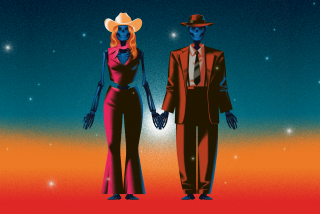Barbie Lives!
- Share via
If there was one thing I loathed as a child it was Barbie. I couldn’t have been more than 7 when I got an early, pony-tailed incarnation for my birthday and I still remember my response: “Ick, she smells funny.” The rubbery scent of her overdeveloped body made my nose itch and I wasn’t impressed by her extensive wardrobe, vanity table, Dream House, convertible or board game either. She did teach me a valuable lesson about consumerism, which I call the Barbie Rule of Life: The doll is cheap; it’s the accessories that break you. (I named my cellular phone Barbie in her honor.)
Though I may have disliked her, I couldn’t escape her. For years, it was impossible to have a birthday party without unwrapping the latest bubble-headed bendable clone. I usually passed it along to my younger brother and sister, who liked to decapitate and dismember Barbie and fling her body parts from a second-story window. I had no guilt about this until recently, when I read “Mondo Barbie,” an anthology of fiction and poetry edited by Richard Peabody and Lucinda Ebersole (St. Martin’s Press: $12.95).
Suddenly, I realized that Barbie could have been a major muse in my life. She inspired the 33 authors in this book to the sort of revelations I usually associate with therapy. For example, in the humorous essay, “How Barbie Warped Me,” Lisa B. Hershovits confesses: “By the time I was a teen-ager, I found myself lusting after women, instead of men. After all, Barbie was a woman, and wasn’t Barbie superior to Ken? Of course she was!” The Angst -ridden Table of Contents includes “Barbie Comes Out,” “Twelve Step Barbie,” “The Barbie Murders,” “Barbie’s Crank Call,” and “Barbie Wonders About Buying a Coffin.”
I haven’t felt so sorry for Barbie since I realized that her earrings went through her head. In this literary celebration, the poor doll is the victim of every woe that befell my generation, from low self-esteem to sexual harassment to toxic relationships. (And I thought she was just a toy.) The stories and poems are occasionally self-indulgent, but they are well-written. And Barbie does finally shine in the lyrical short story “Floor Show” by Julia Alvarez (author of the novel, “How the Garcia Girls Lost Their Accents”), when she helps an immigrant girl express her mixed feelings about life in America.
I was about to break down and send my niece a Barbie, when I received word that a set of revised, politically correct Nancy Drew books have been released. What will the Baby Boom wave of nostalgia dredge up next, I wondered. The Best of Chatty Cathy compact disc?
More to Read
Sign up for our Book Club newsletter
Get the latest news, events and more from the Los Angeles Times Book Club, and help us get L.A. reading and talking.
You may occasionally receive promotional content from the Los Angeles Times.






